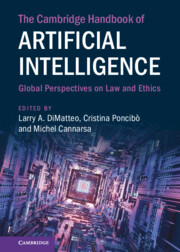45 results
Contents
-
- Book:
- The Cambridge Handbook of Artificial Intelligence
- Published online:
- 28 July 2022
- Print publication:
- 11 August 2022, pp v-viii
-
- Chapter
- Export citation
Part IV - AI and Physical Manifestations
-
- Book:
- The Cambridge Handbook of Artificial Intelligence
- Published online:
- 28 July 2022
- Print publication:
- 11 August 2022, pp 161-212
-
- Chapter
- Export citation
Foreword
-
- Book:
- The Cambridge Handbook of Artificial Intelligence
- Published online:
- 28 July 2022
- Print publication:
- 11 August 2022, pp xxi-xxiv
-
- Chapter
- Export citation
Part VI - Ethical Framework for AI
-
- Book:
- The Cambridge Handbook of Artificial Intelligence
- Published online:
- 28 July 2022
- Print publication:
- 11 August 2022, pp 271-344
-
- Chapter
- Export citation
Part VII - Future of AI
-
- Book:
- The Cambridge Handbook of Artificial Intelligence
- Published online:
- 28 July 2022
- Print publication:
- 11 August 2022, pp 345-346
-
- Chapter
- Export citation
28 - AI and the Law
- from Part VII - Future of AI
-
-
- Book:
- The Cambridge Handbook of Artificial Intelligence
- Published online:
- 28 July 2022
- Print publication:
- 11 August 2022, pp 419-428
-
- Chapter
- Export citation
Part V - AI and Intellectual Property Law
-
- Book:
- The Cambridge Handbook of Artificial Intelligence
- Published online:
- 28 July 2022
- Print publication:
- 11 August 2022, pp 213-270
-
- Chapter
- Export citation
Preface
-
- Book:
- The Cambridge Handbook of Artificial Intelligence
- Published online:
- 28 July 2022
- Print publication:
- 11 August 2022, pp xxv-xxvi
-
- Chapter
- Export citation
Part III - AI and Liability
-
- Book:
- The Cambridge Handbook of Artificial Intelligence
- Published online:
- 28 July 2022
- Print publication:
- 11 August 2022, pp 87-160
-
- Chapter
- Export citation
Copyright page
-
- Book:
- The Cambridge Handbook of Artificial Intelligence
- Published online:
- 28 July 2022
- Print publication:
- 11 August 2022, pp iv-iv
-
- Chapter
- Export citation
Part II - AI: Contracting and Corporate Law
-
- Book:
- The Cambridge Handbook of Artificial Intelligence
- Published online:
- 28 July 2022
- Print publication:
- 11 August 2022, pp 43-86
-
- Chapter
- Export citation
Part I - AI: Development and Trends
-
- Book:
- The Cambridge Handbook of Artificial Intelligence
- Published online:
- 28 July 2022
- Print publication:
- 11 August 2022, pp 1-42
-
- Chapter
- Export citation
Contributors
-
- Book:
- The Cambridge Handbook of Artificial Intelligence
- Published online:
- 28 July 2022
- Print publication:
- 11 August 2022, pp xi-xx
-
- Chapter
- Export citation
Figures
-
- Book:
- The Cambridge Handbook of Artificial Intelligence
- Published online:
- 28 July 2022
- Print publication:
- 11 August 2022, pp ix-x
-
- Chapter
- Export citation

The Cambridge Handbook of Artificial Intelligence
- Global Perspectives on Law and Ethics
-
- Published online:
- 28 July 2022
- Print publication:
- 11 August 2022
16 - Ethics Guidelines for Trustworthy AI
- from Part V - Legal Ethics and Societal Values Confront Technology
-
-
- Book:
- The Cambridge Handbook of Lawyering in the Digital Age
- Published online:
- 18 November 2021
- Print publication:
- 25 November 2021, pp 283-297
-
- Chapter
- Export citation
Part III - Legal Tech in Consumer Relations and Small Claims
-
- Book:
- The Cambridge Handbook of Lawyering in the Digital Age
- Published online:
- 18 November 2021
- Print publication:
- 25 November 2021, pp 157-236
-
- Chapter
- Export citation
Figures
-
- Book:
- The Cambridge Handbook of Lawyering in the Digital Age
- Published online:
- 18 November 2021
- Print publication:
- 25 November 2021, pp xvii-xviii
-
- Chapter
- Export citation
Part IV - Legal Tech and Public Law
-
- Book:
- The Cambridge Handbook of Lawyering in the Digital Age
- Published online:
- 18 November 2021
- Print publication:
- 25 November 2021, pp 237-280
-
- Chapter
- Export citation
Contents
-
- Book:
- The Cambridge Handbook of Lawyering in the Digital Age
- Published online:
- 18 November 2021
- Print publication:
- 25 November 2021, pp v-vi
-
- Chapter
- Export citation



